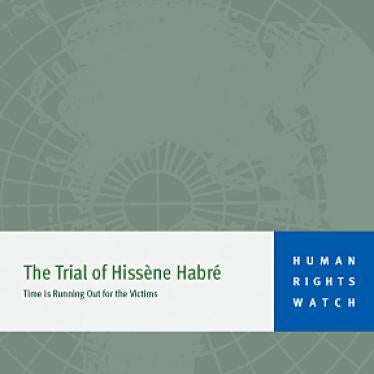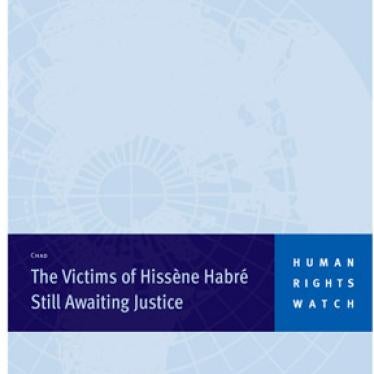(New York) - The African Union (AU) should attach top priority to civilian protection and bringing human rights abusers to justice when it meets for its summit meeting in Ethiopia next week, Human Rights Watch said in an open letter to AU Chairman Jean Ping today. The AU summit takes place from January 26 to February 3 in Addis Ababa.
The letter analyzes the human rights crises in Somalia, Zimbabwe, the Democratic Republic of Congo, Sudan, and Guinea. It points out that every party to the Somalia conflict has committed war crimes and serious human rights abuses. The cumulative impact on civilians has been devastating. Thousands have been killed and more than 1 million displaced.
"The AU should ask the United Nations Security Council to establish a Commission of Inquiry into the worst human rights abuses in Somalia," said Georgette Gagnon, Africa director at Human Rights Watch. "It would begin the fight to bring those responsible to justice and send a clear message of solidarity to long-suffering Somalis."
Increasing attacks on aid workers in Somalia are also preventing an effective response to a growing humanitarian crisis - 3 million Somalis are in need of assistance.
In eastern Democratic Republic of Congo (DRC), all sides to the conflict have committed serious human rights abuses, including the National Congress for the Defense of the People (CNDP) rebels and the Congolese armed forces. Meanwhile, the horrific killings carried out by the Lord's Resistance Army (LRA) recently in Orientale province highlight again the inadequacy of international, local, and regional efforts to protect civilians.
"The violence in the eastern DRC has caused horrendous loss of civilian life," said Gagnon. "Rwanda and DRC should stop supporting abusive armed groups, and the AU should demand a full and independent investigation into human rights abuses."
Gagnon noted that the International Criminal Court (ICC) has already issued an arrest warrant for a senior CNDP member, Bosco Ntaganda, and senior LRA leaders. The African Union should demand that they be apprehended and handed over, she said.
Reports from the ground in eastern DRC suggest that Rwanda's armed forces have recently crossed the border and that the UN is being denied access to certain areas containing displaced civilians. Human Rights Watch expressed renewed concern for the safety and protection of the civilian population in eastern DRC.
In Sudan, there has been some progress deploying the UN peacekeeping mission in Darfur (UNAMID). But the critical test is whether civilians are being protected. Local Sudanese officials continue to obstruct UNAMID. Elsewhere, implementing the 2005 north-south Comprehensive Peace Agreement (CPA) is well behind schedule, including preparations for this year's national elections. Both sides have deployed forces to contested border areas, and there is a serious risk of new violence.
"The African Union should urge all sides to move forward with the peace agreement, but efforts to secure peace should not come at the expense of justice and allowing the International Criminal Court to pursue its work free from political interference," Gagnon said. "No one should be allowed to use the warrants as an excuse to commit further violence, to obstruct peacekeepers and aid workers, or to harass and abuse human rights activists who speak out for justice."
Zimbabwe is on the point of collapse. More than 2,000 people have died in a cholera epidemic, and tens of thousands are infected. Thousands have also died from hunger, HIV or related diseases. More than 5 million Zimbabweans - half the population - need international food aid. With victims of political repression also fleeing across Zimbabwe's borders, the regional situation is dire. ZANU-PF's leader Robert Mugabe will attend the summit despite having lost elections in 2008.
"The African Union has one final chance to ensure a change of course in Zimbabwe before the country collapses," said Gagnon. "The AU summit should condemn ongoing abuses by ZANU-PF, insist that it end politically motivated violence, enforced disappearances, and torture. It should appoint a new emergency team of independent, impartial mediators, who can set clear benchmarks and timelines for resolving the crisis. Finally, the AU should suspend Zimbabwe if - within a specific timeframe - ZANU-PF does not stop its abusive practices."
The AU summit in Egypt in June 2008 appealed to all sides in Zimbabwe to refrain from actions that would negatively impact on dialogue. Human Rights Watch said that by continuing to abduct and torture its opponents, ZANU-PF has clearly and blatantly ignored that appeal.
Human Rights Watch has welcomed the African Union's decision on December 29, 2008 to suspend Guinea following the military coup. Next week's summit offers an opportunity to maintain pressure on Guinea's current rulers - the so-called National Council of Democracy and Development (CNDD). The African Union should set CNDD clear benchmarks, such as holding internationally run parliamentary and presidential elections in 2009 and making the stalled National Commission of Inquiry and the National Observatory for Human Rights (ONDH) fully operational.






